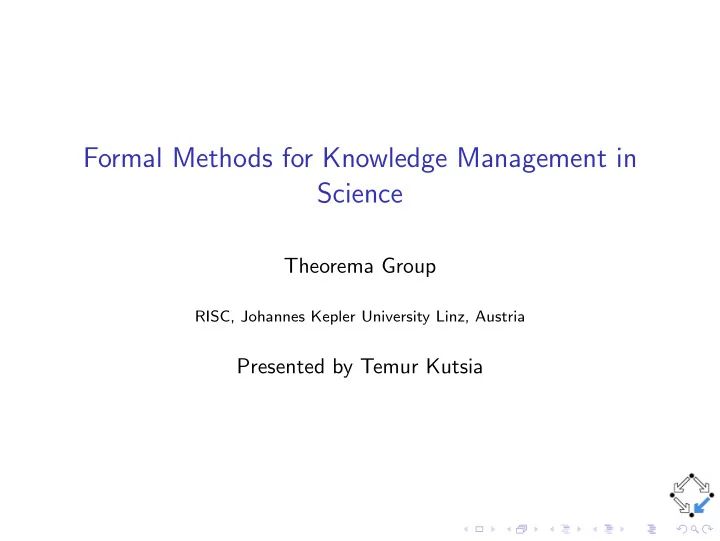

Formal Methods for Knowledge Management in Science Theorema Group RISC, Johannes Kepler University Linz, Austria Presented by Temur Kutsia
The Theorema Project ◮ Initiated and led by Bruno Buchberger. ◮ Aim: extending current computer algebra systems by facilities for supporting mathematical proving, to create a mathematical assistant system.
Outline Mathematical Knowledge Management Reasoning and Exploration in Theorema Ideas
Outline Mathematical Knowledge Management Reasoning and Exploration in Theorema Ideas
Mathematical Knowledge Management Two parsings: ◮ Mathematical (Knowledge Management) ◮ (Mathematical Knowledge) Management
Mathematical Knowledge Management ◮ Definitions, theorems, proofs, algorithms, conjectures, problems, examples,... ◮ Vast knowledge is generated. ◮ “The total number of pages published in mathematics so far makes up a stack of about 60 km height.” (M. Hazewinkel, 2003). ◮ Managing such knowledge is a very difficult task.
Storing Mathematical Knowledge ◮ Mathematical knowledge repositories: digitized vs formalized. ◮ Examples of digitized: sciencedirect, ACM DL, SpringerLink, arXiv, Safari Books Online, NIST Digital Library of Mathematical Functions, MathWorld, etc. ◮ Examples of formalized: the Mizar library, The Coq library, TPTP, Wolfram functions, HELM, etc.
Accessing Mathematical Knowledge In digitized format: ◮ Searching (metadata, full text). ◮ Browsing. Pretty restricted.
Accessing Mathematical Knowledge ◮ Formalized approach requires more rigor. ◮ But it opens more possibilities to access the knowledge, beyond just searching and browsing. ◮ One should be able to use e.g. a proposition in the query and find out whether it follows from the knowledge base. ◮ Theorem proving. ◮ One should be able to find out what “interesting” consequences can be drawn from the knowledge base. ◮ Theory exploration. Formalized vs Digitized proving vs searching exploration vs browsing
Access Options May Influence Storing ◮ In digital approach, store all knowledge. ◮ (It would be odd to keep only odd pages of a paper.) ◮ In formal approach, store only important/difficult data. ◮ (If the proof engine can prove a theorem from the knowledge base in milliseconds, there might be no need to store this theorem.)
Outline Mathematical Knowledge Management Reasoning and Exploration in Theorema Ideas
Reasoning and Exploration in Theorema ◮ Mathematical assistant system. ◮ Implemented in Mathematica. ◮ Integrates proving, solving, and computing. ◮ Flexible “external” syntax. ◮ Human-readable proof presentation.
Reasoning and Exploration in Theorema ◮ Library of general and special reasoners. ◮ Special = fixed theory, e.g. RCF, set theory, ... ◮ Access to powerful computer algebra algorithms from the Mathematica system. ◮ On the meta-level, allows programming of reasoning tactics. ◮ Aims at supporting theory exploration process.
Reasoning and Exploration in Theorema Theorema components for reasoning and exploration
Exploration in Theorema ◮ Theory exploration involves inventing new notions, propositions, algorithms, ... ◮ Theorema approach: Guide the inventing process by schemata. ◮ Schemas are stored in the schema library. ◮ Examples of schemas: ◮ alternating quantification (definition scheme), ◮ is-homomorphic (proposition scheme), ◮ divide-and-conquer (algorithm scheme), ◮ etc. ◮ Invention − → synthesis.
Exploration in Theorema ◮ Synthesis by B. Buchberger’s “Lazy thinking” technique. ◮ “Lazy thinking” is a schema-based deductive synthesis method. ◮ Powerful enough to synthesize a nontrivial algorithm: Buchberger’s algorithm for computing Gr¨ obner Bases.
Outline Mathematical Knowledge Management Reasoning and Exploration in Theorema Ideas
Ideas For Future Work Formalized approach to MKM opens new perspectives. ◮ On the one hand, we plan to work on strengthening the reasoning and exploration capabilities of Theorema with the aim to be used in mathematical knowledge management. ◮ On the other hand, we have a potential to do something radically new for the organization of science, namely ◮ automation of quality control, ◮ archiving and retrieving of information in scientific publications, ◮ discovering “hidden” knowledge from the (formalized) literature.
More Information For contact information, publications, software download, please visit the Theorema Web page: www.theorema.org
Recommend
More recommend